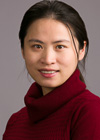QING DENGProfessor765-494-0423 LILY G-231 qingdeng@purdue.edu Associated website(s): |

|
PROFESSIONAL FACULTY RESEARCH
neutrophils, microRNA, cell migration, and immune engineering
BIO
The Deng lab's research aims to deepen our understanding of neutrophil biology and offer targeted therapies that could change the lives of countless individuals suffering from devastating diseases.
By utilizing zebrafish as a model organism, the Deng lab is uncovering exciting new genes and signaling mechanisms that govern the migration and activation of neutrophils, our bodies' powerhouse white blood cells. This research expands our understanding of neutrophil function and sheds light on their involvement in diseases like cancer, diabetes, ischemia-reperfusion, and neuronal degeneration. One of the most remarkable aspects is that the Deng lab successfully validates its findings in human neutrophils. This means that their discoveries directly relate to human health, paving the way for the development of revolutionary neutrophil-centric therapies. The knowledge gained from zebrafish studies can be harnessed to treat chronic or aberrant neutrophil activation diseases and significantly impact patient care.
In addition, collaborating with the Bao lab, the Deng lab is pushing the boundaries by developing neutrophil products derived from induced pluripotent stem cells. This cutting-edge approach opens up a new realm of possibilities for adoptive transfer therapy. Genetically engineered specialized neutrophil products are in the commercialization process to combat solid tumors. The team is working diligently to expand the utility of neutrophil products to other significant diseases.
- People
- Faculty
- Staff
- Postdoctoral
- Emeritus